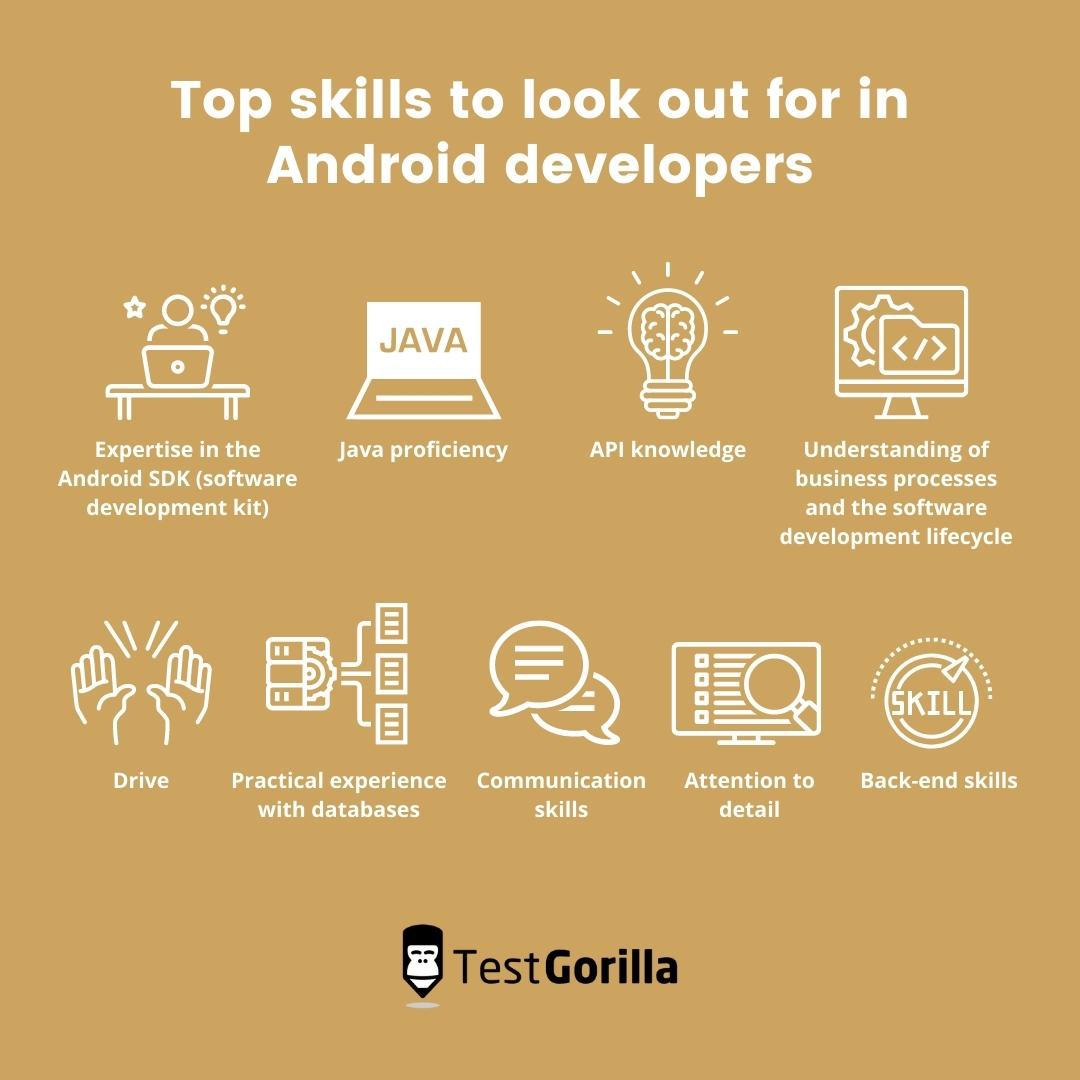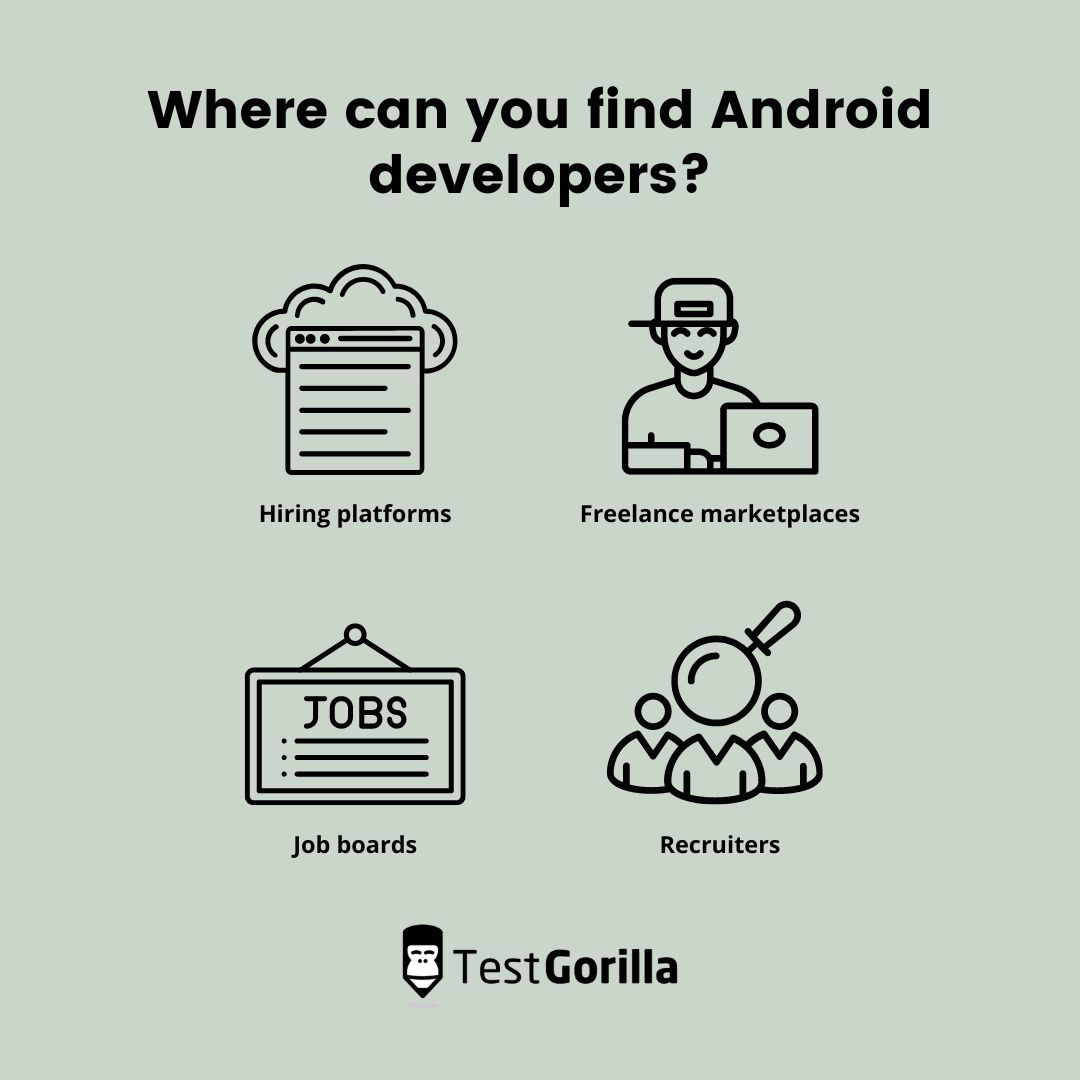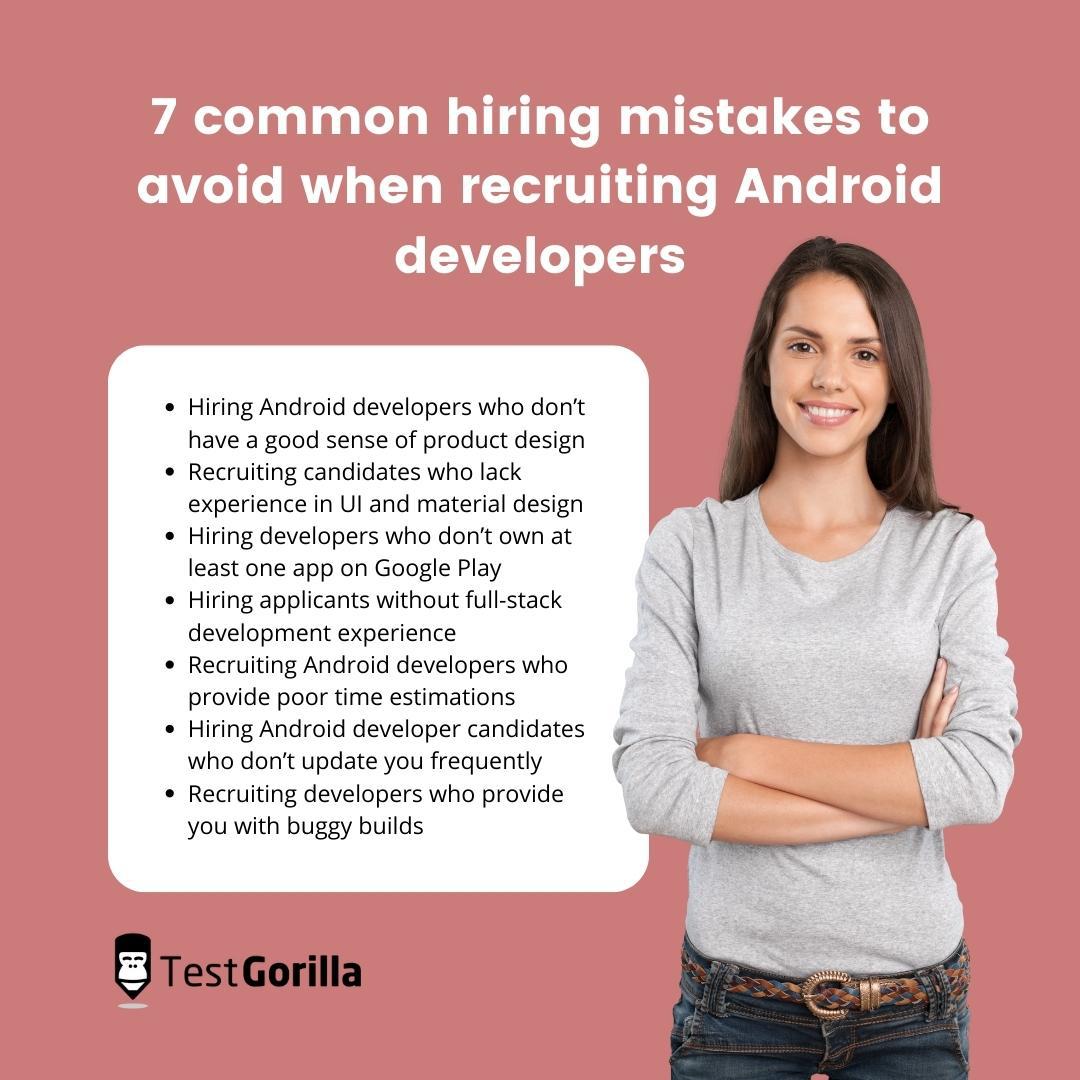There is increasing competition among development companies to build high-quality Android apps for users, resulting in a higher demand for Android developers than ever. Given the popularity of mobile apps, you can expect this demand to keep rising.
With many individuals now pursuing a career in Android development, it’s easier to find Android developers globally, but you may encounter problems hiring a qualified developer who fits your business needs.
How can you find and hire the best Android developer?
Not to worry – we’ve compiled everything you should know about hiring top Android developers. In this article, we’ll explain who an Android developer is, what they do, and the key technical and soft skills they require.
We’ll also explore their work environment, salary, where to find them, and the best tips for hiring.
In addition, we’ll discuss how you can use skills tests like TestGorilla’s Java data structures test and Kotlin algorithms test to assess candidates’ Android development skills.
Table of contents
- Who is an Android developer?
- What does an Android developer do?
- Top skills to look out for in Android developers
- What is the work environment of Android developers like?
- How much does an Android developer earn?
- Steps to hire an Android developer
- Where can you find Android developers?
- 3 tips for hiring an Android developer
- 7 common hiring mistakes to avoid when recruiting Android developers
- Use skills testing for a better recruitment experience
Who is an Android developer?
Android developers are software developers who design apps for the Android operating system and distribute them on the Google Play Store for Android users. They have created applications for millions of users who use various Android devices and gadgets.
These developers typically work for software development companies and use their analytical expertise and programming skills to build apps for Android users.
An Android developer’s career usually starts at the entry-level, and then they build on their experience to eventually take on senior roles.
Android developers often have college degrees in software development or similar fields and require no experience to take on an entry-level role.
What does an Android developer do?
Android developers use common programming languages like Java and Kotlin to develop useful apps for Android users. The following are core responsibilities Android developers handle in their daily work activities:
1. Design and build apps for the Android platform
Android developers spend most of their work hours building and updating Android apps. They use JavaScript, C++, Kotlin, and other programming languages and tools to write code for Android devices.
Developers require attention to detail because a single mistake in their code can disrupt the entire program. Depending on the complexity of the task they’re working on, they may partner with other app developers or develop apps themselves.
2. Collaborate with cross-functional teams
Android developers work on product development, user experience, and other development tasks to design and create new features for users. They brainstorm about how they can develop useful features that solve users’ problems.
3. Troubleshoot and fix bugs
Android developers are also responsible for troubleshooting and fixing bugs in new and existing apps. They continue to monitor apps even after building them to identify and resolve any issues they missed during development.
The best developers are attentive to user complaints and address their concerns quickly. They also perform module testing throughout the software development cycle and can quickly create software patches to resolve any problems their apps may have.
4. Find and implement new development tools
Android developers stay up to date with current trends in mobile app usage. They test new tools and determine if they can improve their productivity. They must frequently adapt to changes in the industry and the world to create the best Android products.
5. Work with outside data sources and APIs
It’s also common for Android developers to work with external data sources and APIs to create more useful and responsive apps efficiently. They require excellent critical-thinking skills to understand and implement these resources in their project.
The best insights on HR and recruitment, delivered to your inbox.
Biweekly updates. No spam. Unsubscribe any time.
Top skills to look out for in Android developers
Developing mobile applications in today’s world requires knowledge of current events and software development skills. Android developers must be proficient in programming languages that are integral to Android development, like Kotlin, C++, and JavaScript.
Besides technical abilities, they need soft skills to succeed in their interactions and professional relationships. A combination of excellent technical skills and exceptional soft skills differentiates top developers from the rest. Below are the most important technical and soft skills Android developers should have:
Technical skills
Technical software development skills are crucial for writing code and developing apps. They enable developers to perform complex procedures and use tools that aid app development.
It’s not enough to be proficient in Android-related programming languages alone. Expert developers must know how to use a range of coding tools to increase the quality and usefulness of their applications.
The following are the technical skills top Android developers require:
1. Java proficiency
Java is the most commonly used programming language for building Android apps. Although Java knowledge alone can’t make one a top Android developer, it’s not a stretch to say that expertise in this language is essential in the industry.
You can gauge developers’ Java mastery by asking them their opinions on Java Native Interface and what Java data type to use in different situations. Advanced Java debugging skills are necessary for any great Android product, and top Android developers continuously expand their Java skills.
2. Expertise in the Android SDK (software development kit)
You should expect any top Android developer to understand how to use layouts, views, and the activity lifecycle in Android Studio and other Android development tools. They should also know how to operate the integrated development environment debugger to troubleshoot code bugs.
3. API knowledge
Expert Android developers can work with any API and use it to link apps to third-party digital services. You can test an Android developer’s API skills by asking them about JSON/REST APIs and XML/SOAP.
They can also use Google APIs to find users and help them search for a local business or reference a map in the app.
4. Back-end skills
The back end is the part of a web app that users don’t see and controls how it operates behind the scenes. Android developers use back-end skills to manage data changes triggered from the front end and create robust networks that can handle multiple concurrent user requests.
5. Practical experience with databases
Expert Android developers must have sufficient hands-on experience in using databases. Specifically, they should know how to share data across connected devices using SQLite databases. Firebase is another common database they can use to store data in the cloud.
6. Understanding of business processes and the software development lifecycle
Top Android developers understand your needs and business processes. They can identify vital characteristics and build an efficient and bug-free app that meets your needs and contributes to the overall success of your organization.
Non-technical skills
Technical skills aren’t enough on their own. Developers also need soft skills to complement their software development knowledge and work effectively.
Here are the essential soft skills to identify in Android developers:
1. Communication skills
Excellent communication skills are crucial for almost every profession because they help employees interact with others and convey information clearly. Top Android developers require strong verbal and written communication abilities to interact with clients and teammates.
Android developers communicate internally to share information with colleagues about a project and ensure that all stakeholders understand the processes they are following to complete it. Communication skills also help developers understand the client’s needs and explain aspects of the app and its development to them.
2. Drive
You can identify the best Android developers through their willingness to learn, expand their skill set, take on new challenges, and explore new development tools. You can discover whether they are motivated by engaging them in conversations about their past work experiences and projects.
If you observe passion and drive in their tone, they are more likely to be self-driven and determined to help you build your app.
3. Attention to detail
Android developers must be attentive to even the tiniest details when creating an app. Any slight error in the code can hinder the development process or create results that don’t match the client’s needs.
Top developers with strong attention to detail listen closely to clients’ requests, take careful note of the specifications, and deliver results that meet their expectations.
What is the work environment of Android developers like?
Android developers can work in various settings, including for large companies, startups, government agencies, and private contractors. Depending on the client’s needs and the project’s nature, they may work alone or with a team.
Although they do their job during usual business hours, they may work overtime in the evening, on weekends, or even during holidays to finish urgent tasks or large projects. Android developers may also travel to meet with clients.
They often work under pressure and may need to manage several projects simultaneously. Regardless of their work setting, they require creative skills and problem-solving abilities to identify and find solutions to challenges.
How much does an Android developer earn?
According to Payscale, the average annual base salary for an Android developer in the United States is $91,580. Android developers in the bottom 10% make $60,000 yearly, and those in the top 10% earn more than $135,000 yearly.
They may also enjoy yearly bonuses between $1,000 and $17,000. Other benefits can include paid leave, health insurance, and travel allowances, depending on the employer.
Steps to hire an Android developer
Whatever method you use to find your next Android developer, don’t leave your final decision to chance.
Ascertaining Android developers’ experience isn’t easy, so follow the steps below to hire top Android developers who can help your business succeed:
1. Build a candidate profile
Finding top Android developers for your project requires you to understand the role in depth. You can collaborate with other hiring agencies and HR consultants to learn about the role, its requirements, and how it can contribute to your organization.
After gathering this information, you can use it to draft a candidate profile for the job opening.
2. Prepare a technical description for your project
Once you determine the requirements for the role, you should establish the technical skills your organization requires. You should also determine what soft skills align with your company culture and support the app development process.
Then, compile this information to prepare an extensive job description. If you’re not prepared to draft a good job description or want to hasten the process, you can consult our mobile app developer job description template.
Here are five sections that your job description must have:
Job title, location, and employment type
Company overview, vision, mission statement, and culture
A comprehensive list of daily tasks
Skills and qualifications required for the role
Work benefits
3. Choose the most suitable employment model
There are several employment models you can choose from when hiring developers. If you want developers to join your organization permanently, you can choose a full-time employment model. However, note that this is the most expensive model.
On the other hand, you can search for freelance developers if you prefer temporary employment contracts.
4. Conduct prescreening tests
Prescreening tests are assessments you can use to examine candidates’ knowledge and practical skills for a job. Using pre-employment tests is a better employee selection method than resumes, which are less objective and reliable.
You can include online pre-employment tests on your career page or conduct a physical assessment to discover the best candidates for the job. When conducting skills testing, ensure you pick a reliable platform like TestGorilla to hire the best developers.
TestGorilla offers a wide range of tests for evaluating Android developers. Our simulation-based assessments will help you gauge candidates’ programming skills at entry and top levels.
For example, you can use the Java coding algorithms test to examine Android developers’ Java abilities. This test analyzes candidates’ ability to write simple algorithms in Java.
5. Conduct technical interviews
The next step is to interview the most promising candidates based on their results on the prescreening tests. Depending on your organization’s policy, you can choose to conduct virtual or physical interviews or both. Interviews help you learn more about your top candidates and choose the one most qualified for the role.
Virtual interviews can save costs and time and enable you to speak with candidates who are unable to travel to attend a physical interview.
Physical interviews are best for learning about candidates’ personalities and evaluating their communication skills. You can also provide them with assessments to complete under supervision.
6. Finalize the agreement and sign the contract
Once you find the ideal candidate to work with, discuss all aspects of the work process with them. If you are hiring for in-house app development, you can offer them a reasonable salary and enter into an employment contract.
However, if you are hiring a freelancer temporarily for an Android app development project, remember to sign non-disclosure agreements first. Then you can discuss the project extensively and agree upon the expected duration, cost, and work hours.
Ensure your offer takes into account the employee’s worth and the value you expect them to bring to your project. Offer attractive compensation packages and bonuses to entice the best candidates. You can check the average Android developer’s salary to guide your negotiations.
Where can you find Android developers?
If you are wondering how to find skilled Android developers, below are four credible sources to support your search process:
1. Hiring platforms
There are many good hiring platforms for finding top Android developers and tech-based experts. It’s a good idea to choose platforms that verify their developers to ensure they have adequate Android developer skills and experience.
Examples of hiring platforms include Arc and Dice.
2. Freelance marketplaces
You can also try searching for Android developers on freelance marketplaces. Some niche and general marketplaces help you connect with freelance developers and other tech professionals. Examples are Upwork, Toptal, and Freelancer.
It’s often a safer bet to use niche freelance marketplaces since they screen their developers for technical knowledge, experience, and expertise. Always be wary of unverified freelancers if you use a general freelance platform.
3. Job boards
Job boards are another useful type of platform for hiring top Android developers. You can easily find them and view their credentials on popular job boards like LinkedIn.
LinkedIn is useful for connecting with people who may have credible Android developer leads. You can also conduct a passive job search by placing job ads to support your organic search efforts.
4. Recruiters
Another option is to use recruiting agencies to locate Android developers in your community. These agencies help you screen, match, and interview eligible candidates. Another unique feature is their expertise in specific domains, which enables them to find readily available Android developers.
Though recruiting agencies can be expensive, they save you and your staff the time and stress of searching for talent on your own. If you have a sufficient budget, hiring a private recruiter or headhunter can be a great choice.
3 tips for hiring an Android developer
Follow these tips to enhance your employee selection process and recruit the best candidates for your Android developer job:
1. Conduct detailed screening
Determining a candidate’s technical expertise goes beyond assessing their knowledge of programming languages and Android coding concepts.
In addition to evaluating their technical skills, remember to test other essential skills that matter to your company, such as attention to detail and critical thinking skills.
2. Examine candidates’ past work
Top Android developers require significant experience and a rich work portfolio containing various Android app development projects. When examining their portfolios, identify apps that have responsive designs and excellent user interfaces.
You can also ask candidates to show you their Stack Overflow profiles so that you can learn more about their problem-solving abilities. Inquire if they have a professional website or an open-source code repository on which they share their past work.
Analyzing candidates’ past work enables you to gauge if their skills, experience, and work style match your project’s or organization’s needs.
3. Ask relevant questions
Suppose a candidate passed the prescreening test, has an incredible portfolio, possesses all the necessary skills, and displays a personality and values that align with your company culture. At this point, they are an 80% fit for your project.
Though you may find this to be enough to offer them the job, you should still engage them in discussions first. Ask them questions about Android development and their past experiences.
You can research the best programming skills interview questions to aid the process. Below are some Android development questions you can ask them:
What is a fascinating Android app you worked on? What made that project interesting?
What is the most challenging Android app you have worked on? Why?
Have you made a project decision that failed? How did it fail? What did you learn from the experience?
Which programming language do you prefer and why?
How far do you hope to advance in your Android development career?
7 common hiring mistakes to avoid when recruiting Android developers
Mis-hiring can cost you time, energy, and resources and leave you with an unqualified Android developer. The safest method for verifying whether developers can handle your projects is paid trials.
You can test them by giving them basic tasks before they take on bigger projects. Below are some hiring mistakes to avoid when recruiting Android developers for your project or organization.
1. Hiring Android developers who don’t have a good sense of product design
Hiring Android developers with experience in product design can help you make the most of your budget and resources during app development.
For example, you may consider making a payment page for your app. Initially, it may display nothing more than user details and a single payment option.
But in real life, a payment page offers several payment methods for users to pick from, options to use coupon codes and discounts, and other elements. Can your developer candidate design a page that includes all of these details?
2. Recruiting candidates who lack experience in UI and material design
In your hiring process, pay attention to candidates who can use their UI/UX skills to enhance mobile apps. Though you may hire a designer separately to work on your app’s visuals, Android app developers should also have basic knowledge of user interfaces.
As the app evolves during development, your developers will need to update the user interface to adapt to new product changes and features. Getting a designer to handle every slight UI modification can delay the project and increase costs.
Top Android developers know how to deal with some aspects of the design work themselves and are familiar with modifying UI elements to improve their apps.
3. Hiring developers who don’t own at least one app on Google Play
Top Android developers should be able to show you some of their past works on Google Play so that you can gauge their experience level. Ask that they show you at least one Android application on the platform that they have worked on.
Make sure that they understand how to properly upload apps to Google Play. The number of apps they have published may also indicate how much passion they have for building Android apps.
4. Hiring applicants without full-stack development experience
Many applications require databases to support their operations. If you’re developing such an app, it’s important to hire an Android developer with the right database skills.
If the database operations are complex and require top database expertise, you may still need the services of an expert database operator. However, the database framework for your mobile app’s first version will likely be basic and simple.
If this is the case, Android developers can use their knowledge to program various database operations by using an API. Google Firebase is an ideal tool they can use for this purpose to ease the entire development process.
5. Recruiting Android developers who provide poor time estimations
You can also use the paid-trial method to assess candidates’ work styles and how long it takes them to accomplish the task. Android development, like any software development process, involves handling multiple tasks and finishing projects within the set time.
Give applicants minor tasks to complete, and set a deadline for each task. Expert Android developers always finish on time and often even accomplish projects ahead of schedule to make more time for modifying the app, adding new features, or fixing bugs.
Pay attention to when they complete their tasks to learn if they can finish projects on time. You should only trust them with more complex work if they can finish small tasks within the projected time frame.
Professional Android developers nearly always accomplish their tasks on time. But if they do need more time for any reason, they should inform their clients well before the deadline.
6. Hiring Android developer candidates who don’t update you frequently
During the trial process, notice how frequently your candidates update you on important developments in the project’s lifecycle. You can ask them to provide you with information at regular intervals or only when there is a major development or setback.
Either way, stay attentive to whether they can meet your request and whether they provide you with sufficiently detailed information. Working with an Android developer who seldomly updates you on their progress can negatively impact collaboration in your business and delay tasks.
7. Recruiting developers who provide you with buggy builds
After delegating a task to candidates, ensure you test their work to find any errors. This will reveal how well the developers can identify and solve problems through proper product testing.
This is a crucial step because Android developers must have the skills to identify bugs before they release a new version. If they lack these abilities, they may build buggy applications.
If you don’t supervise them properly, the product may reach end users, who might find the app unsatisfactory and write negative comments about it on the Google Play Store. Always assess applicants’ initial builds and examine them for errors.
Note that there are many useful testing tools and libraries for Android, so you can ask candidates if they have experience with them. Though the time frame of the trial may not enable you to explore testing libraries with candidates, this is an aspect of Android development that they should know well.
Use skills testing for a better recruitment experience
It’s vital to know that resumes aren’t reliable indicators of candidates’ true skills. It’s easy for an applicant to exaggerate their work credentials and expertise.
A resume may also fail to properly represent a candidate’s skill level due to their skill set being poorly written or outdated.
On the other hand, pre-employment skills testing is a more modern and objective hiring method that enables you to accurately examine candidates’ software skills and non-technical skills.
Prescreening tests make up for the inadequacies of CVs and provide a better recruitment experience.
Switching to this emerging recruitment style improves the quality of your hires and helps you achieve your goals with exceptional employees around you.
Create an account with TestGorilla today to reshape your recruitment process and hire top experts.
You've scrolled this far
Why not try TestGorilla for free, and see what happens when you put skills first.


















